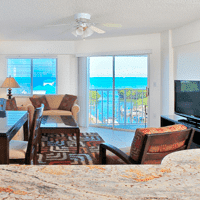Making a condominium hotel sustainable is no simple task. A green initiative at such a property requires buy-in not only from the property’s unit owners but also from employees and guests. But in 2007, Florida-based Provident Hotels & Resorts decided it was up to the task.
“Quite simply, we wanted to become more environmentally friendly and decided we’d do what it took to get there,” says Sam Harp, director of operations, who is spearheading Provident’s efforts to make all of its condominium hotels as green as possible.
Provident was established in 1976 as a residential condominium manager, but after converting an existing hotel into a condominium hotel, it became one of the first companies on Florida’s Gulf Coast to work in this specialized industry of mixed-use facilities. Individuals own the condos, but Provident manages the condo association and runs a rental program that helps individual condo owners lease their units if they so choose.
The challenge of making a big change at a condo hotel, says Harp, is that it requires buy-in from all affected parties. Provident, however, devised a solution. “We communicated our vision to general managers and ran a contest whereby employees could submit a name for the program,” Harp says. “The result was Destinations Green, which struck a chord with clients since sustainability is big in the hotel industry.”
To move forward, Provident worked with the Florida Green Lodging Program, which awards one, two, or three “palms” to hotels that meet increasingly difficult sustainability goals. The program Provident ultimately developed seeks sustainability in four categories: energy conservation, water conservation, recycling, and air quality, which involves green cleaning products, paper products, and cleaner air-handling systems with HEPA filters.
Some initiatives are a wash financially, such as Provident’s recycling program, through which housekeepers and owners are asked to separate trash into recyclable and nonrecyclable categories. “Adding a recycling contractor adds $100 to $300 per property per month but reduces trash-collection costs, which are based on the quantity of material collected,” Harp explains. Other initiatives significantly reduce costs. Reducing the laundering of towels and linens—typically done off-site with the help of vendors such as Exceptional Linens—has cut associated costs by 25 percent. Replacing CFLs with LEDs in a single hotel’s public areas reduced energy use by 30 percent. And switching to greener cleaning supplies and paper products cost 5–10 percent less than the ones the company was previously using.
Today all five Provident properties—the Mutiny Hotel in Miami, Ocean Point Suites in Key Largo, Sailport Waterfront Suites in Tampa, Sunset Vistas Beachfront Suites in Treasure Island, and Aqualea Resort Condominium in Clearwater Beach—are either certified by the Florida Green Lodging Program or in the process of being certified.
“When we started this project, I’d heard how expensive a proposition going green is, but that hasn’t been true,” Harp says. “If you’re creative, you can become a really green-friendly property and save money while you’re doing it.”


